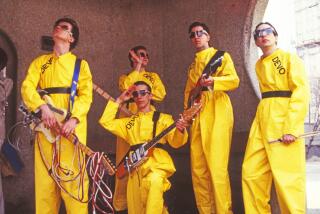Picking Up the Beat
- Share via
Seventeen years after emerging from Athens, Ga., to become one of America’s most influential and enduring bands, the members of R.E.M. find themselves starting at square one again after the departure of drummer Bill Berry last fall. Berry was eager to return to a more tranquil lifestyle after suffering from a brain aneurysm in the fall of 1995.
For a band that has always thrived on the creative tension among its four members, Berry’s absence left a huge void and forced singer Michael Stipe, guitarist Peter Buck and bassist Mike Mills to grapple with the question of the band’s identity and future.
Rather than replace Berry with another drummer, the trio saw Berry’s absence as an opportunity to explore new musical textures in the band’s “Up” album, which will be released Tuesday. (See review, Page 64.)
On the eve of the release, Buck, Mills and Stipe discussed this chapter in the band’s saga.
Question: How did Bill Berry’s absence affect the recording of the album?
Stipe: When Bill left, it yanked the rug out from under us, and I think this record reflects that. This record is the sound of R.E.M. turned upside-down.
Buck: It really threw things out of whack. . . . The truth is we had parts of two albums already recorded with Bill, but they were more pop-oriented. . . . Not having Bill forced us to rethink our strategy as a band, and to kind of reinvent ourselves. I don’t play nearly as much guitar as I usually do. I play more bass, and Mike plays a lot of keyboards. Even Michael plays a guitar solo on one track. Without Bill, we kinda figured we’d mess around and try things we might not have tried.
Mills: Our dynamic is entirely different now, and a lot of little things popped up that we couldn’t anticipate.
Q: Do you think of this album as a continuation of your last release, “New Adventures in Hi-Fi,” or a major departure?
Buck: This album is less performance-oriented than anything we’ve done in the past. Whereas before you could listen to one of our albums and imagine a band playing them live in the studio, this is a more complex record and more compositional, I think. It’s kinda like a weird, ‘90s psychedelic record.
Stipe: In a way, it recalls moments from “Fables of the Reconstruction” and “Out of Time” but it really takes about three giant steps forward for us.
Mills: Basically, this record is an opportunity to show that we’re not out of ideas.
Q: It’s certainly not as conventional as some of your earlier albums. Are you worried about alienating your fans, particularly in light of the fact that your last album was also somewhat experimental? What are your sales expectations?
Stipe: I’m sick of everyone being too obsessed with how everything sells in this culture. I wish the pendulum would swing back to where people pay attention to records ‘cause they’re good and not because of what they’re selling.
Buck: Actually, I think our fans are smarter than some other bands’ audiences, and that they’ll get it. Everyone who’s heard it so far thinks it’s one of the best things we’ve done.
Q: This is the second album in a row that you will release without a tour. Why?
Buck: I’m 40 years old now and I have [twin] 4-year-old kids. I really don’t feel like taking a year to travel all over the place.
Mills: I’m disappointed that we’re not touring ‘cause playing live is my favorite thing to do. But in order to tour, you’ve got to feel settled and comfortable as a band, and we just weren’t ready yet.*
More to Read
The biggest entertainment stories
Get our big stories about Hollywood, film, television, music, arts, culture and more right in your inbox as soon as they publish.
You may occasionally receive promotional content from the Los Angeles Times.







